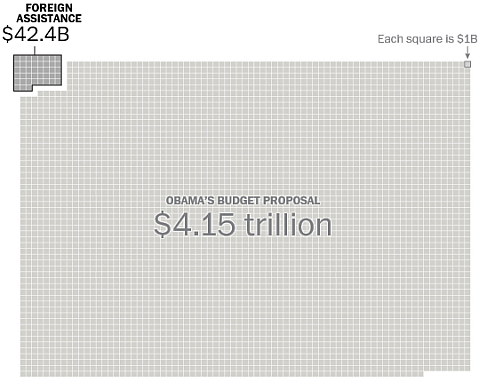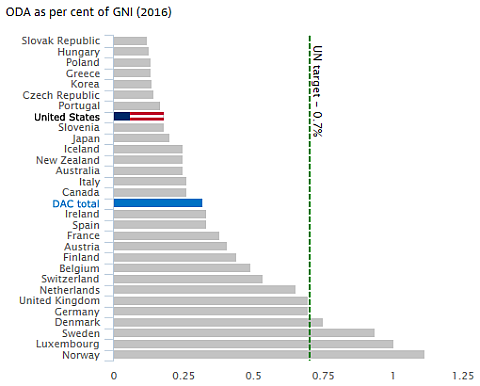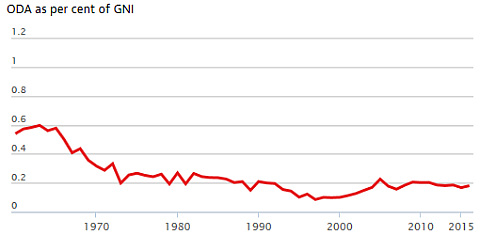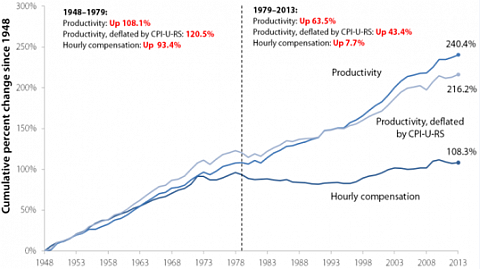Trump's Racism and the Increasing Authoritarianism of Republicans
 I hesitate to comment on Trump's tweets because they're so often a distraction from more important actual policy. His latest racist tweets risk overshadowing his attempted policy change of restricting refugees from seeking asylum (more info: Vox - The Trump administration is dramatically restricting who can seek asylum). But the combination of these tweets being so beyond the pale, a chilling interview I heard on NPR yesterday, and a few disturbing studies I've come across recently, have all contributed to my decision to write about this issue.
I hesitate to comment on Trump's tweets because they're so often a distraction from more important actual policy. His latest racist tweets risk overshadowing his attempted policy change of restricting refugees from seeking asylum (more info: Vox - The Trump administration is dramatically restricting who can seek asylum). But the combination of these tweets being so beyond the pale, a chilling interview I heard on NPR yesterday, and a few disturbing studies I've come across recently, have all contributed to my decision to write about this issue.
Although it's almost surely common knowledge by now, over the weekend, Trump issued a series of tweets with a profoundly racist message:
So interesting to see "Progressive" Democrat Congresswomen, who originally came from countries whose governments are a complete and total catastrophe, the worst, most corrupt and inept anywhere in the world (if they even have a functioning government at all), now loudly......
....and viciously telling the people of the United States, the greatest and most powerful Nation on earth, how our government is to be run. Why don't they go back and help fix the totally broken and crime infested places from which they came. Then come back and show us how....
....it is done. These places need your help badly, you can't leave fast enough. I'm sure that Nancy Pelosi would be very happy to quickly work out free travel arrangements!
Although he didn't call them out by name, it's well understood that Trump was mainly referring to Ilhan Omar, Rashida Tlaib, Ayanna Pressley, and Alexandria Ocasio-Cortez. Three were actually born in the U.S., while Omar became a naturalized citizen as a teenager. Unless you're being deliberately obtuse, it's obvious that Trump was trying to imply that these women weren't 'real' Americans, and the racist intent is quite clear.
White supremacist groups certainly took it that way. The Anti Defamation League compiled a slew of reactions from such parties, with perhaps the most explicit being from Neo-Nazi Andrew Anglin who wrote, "This is the kind of WHITE NATIONALISM we elected him for," and "So this is not some half-assed anti-immigrant white nationalism. Trump is literally telling American blacks to go back to Africa." (The other reactions weren't much better.) When asked point blank by a reporter if this white supremacist support bothered him, Trump answered, "It doesn't concern me because many people agree with me." (source)
All that would be bad enough on its own, but yesterday morning on my way into work, I heard a chilling interview on NPR where they interviewed Adam Kennedy, the official White House Deputy Director of Communications (White House Spokesman Doesn't Back Away From Trump's Racist Tweets). This wasn't simply some random right wing pundit - he was an official representative of the White House. And while I know that politicians always put spin on things, this interview was so chilling because of the outright propaganda, the hostility to these women, the divisive accusations, and the combative stance against the journalists.
I'm going to quote some rather long excerpts from NPR's transcript of the interview, so you can see that I'm not pulling out short isolated comments to try to make Kennedy look worse. The authoritarianism and propaganda are real. Here's the first excerpt:
NOEL KING, HOST: Did the president know the history of this specific racist language when he decided to use it?ADAM KENNEDY: I don't think any of the president's language was racist...
KING: You don't...
KENNEDY: ...I think what he was talking about was that we have some people in this country who liken it to garbage, who attack historically persecuted minorities and who hang out with people who actually killed civilians of allies of this country. And the president wants to stand up and make sure the American people know that he's proud of his country, he's going to stand up for people who aren't.
KING: I think we could refute everything that you just said there, but this is a short interview. You're saying the president...
KENNEDY: Please try. Please try.
KING: ...The president's language is not racist. So the White House is not - is standing by this remark that these women should go back to where they came from.
KENNEDY: The president said that they can stay, they can leave - but that people should be proud of this country. There's a lot to be proud of, just like he is.
KING: Does the president know that three of these women are from the United States of America - born here?
KENNEDY: Again, the point that the president was making is that when you liken this country to garbage; when you say that there is - that the reason we support another country is because of money, which is a historical trope against a persecuted minority in this country; when you hang out with people who attack military and civilian personnel of allies, that's something that should be shocking and that people in this country should be - should know about.
KING: You're talking in part about comments that Representative Omar has made about American Jews - that American Jews found very insensitive, which she apologized for. Before President Trump was president, he was a very vocal critic of President Obama. He was elected after being very critical of the U.S. government. But now he's telling this congresswoman - these congresswomen that they should leave if they're not happy with their government.
I mean, isn't it a core value of this country, of this democracy that you get to criticize people in power, that you get to be critical of the government?
KENNEDY: Absolutely. And this president has said from the beginning that you can be critical of this government. That doesn't mean you have to be - that doesn't mean that you don't have to be proud of this country. This president was proud of this country under President Obama; he's proud of this country now. Some people in this country, some people who say they serve this country haven't said one word about how they like this country. They refer to it as garbage. They say we're having concentration camps. They refuse to condemn attacks on law enforcement personnel. So I think that is very troubling.
KING: All of these congresswomen have said that they love this country. I imagine they would not have run for office if they didn't think the country could improve.
Moving on to the next excerpt:
KING: The president was asked yesterday whether...He was concerned that white nationalist groups are finding common cause with him. He said, quote, "it doesn't concern me because many people agree with me," end quote. Does it trouble you that his language is resonating with white nationalists?KENNEDY: I don't know why it was. But I am troubled that some members of the far-left resonate with terrorists, that their language resonates with people who want to see an ally of this country destroyed, who want to see essentially the character of this nation destroyed.
KING: Sorry. The president said it doesn't concern him that white nationalists are finding common cause with his language. I wasn't clear on your answer. Does this concern you?
KENNEDY: Again, I think what's concerning is that you have people that are trying to cozy up with friends of terrorist organizations, with people who have supported terrorist organizations. And that should be known.
And here's the final excerpt, Kennedy's last substantive comment:
KENNEDY: Again, the president is pointing out the fact that there are some people on the far-left who have decided that the best way forward is demonizing this country and the people in it. That's what he's standing up against. That's what he's pointing out.
The whole interview reeks of propaganda and authoritarianism. Kennedy was blatantly attempting to change the meaning of what Trump actually wrote in those tweets. Go look over Trump's tweets again after having read these excerpts from this interview. I know that Trump has tried to add new comments since those tweets, but what Kennedy is saying is manifestly not what Trump wrote. Despite Kennedy's brief lip service, this really does seem to be attacking these congresswomen for having the audacity to criticize this particular administration.
And look at the actual ways Kennedy is trying to demonize these women. Even if there are kernels of truth to some of these accusations, Kennedy is twisting them beyond all meaningful interpretation, and adding in a few outright falsehoods, to try to make these women look like enemies of the United States.
There's absolutely no contrition or remorse, or even recognition that what Trump said was racist. In fact, there was a glaring lack of any effort by Kennedy to try to distance the White House from white nationalists.
I'm shocked that this was the response from the official White House Deputy Director of Communications during a public interview. How is the media supposed to deal with this White House or be balanced in interviewing both major parties when this is the type of interview response they get from the White House Deputy Director of Communications?
Rather than go into depth myself on Kennedy's various accusations, here are a few appropriate articles and reports:
- Vox - I'm a Jewish historian. Yes, we should call border detention centers "concentration camps": It isn't just accurate. It's necessary.
- Vox - Trump says he's not concerned about being racist because "many people agree" with him: He also falsely accused Ilhan Omar of "speaking about how wonderful al-Qaeda is" in his latest racist rant.
- Center for American Progress - Confronting the Domestic Right-Wing Terrorist Threat
- Anti Defamation League - ADL Releases New Report Highlighting Increase in U.S. Incidents of Murder and Extremism in 2018: From Parkland to Pittsburgh, 2018 was a particularly active year for right-wing extremist murders.
The other issue I wanted to discuss is the increasingly authoritarian mindset of rank and file Republicans as revealed through a study that I recently learned about. The study is described in the article, What Donald Trump got right, and Justin Amash got wrong, about conservatives: Conservatism is an identity more than an ideology, and Trump knows it. Here's the description of the study from that article:
A clever 2018 paper by political scientists Michael Barber and Jeremy Pope tested this experimentally. Trump was constantly adopting contradictory positions on issues, and his reputation for saying and doing anything primed voters to believe he really had said whatever you told them he'd said. "There has never been a president (or any party leader) who shifts back and forth so often between liberal and conservative issue positions," they wrote, and that opened space for a revealing study.Here's how it worked: Barber and Pope asked voters if they agreed or disagreed with different policies. Because of the, erm, flexibility of Trump's rhetoric, they were able to pick policies where Trump had, at some point, taken both a liberal policy position and a conservative policy position. And so some voters were asked about the policy without a cue telling them what Trump thought, but other were asked about the policy and given either Trump's liberal position on the policy or his conservative one.
The idea here was to see how much of a difference Trump's positioning made, and to whom. Among the most interesting findings is in the chart below. The people who identified as most strongly conservative were the likeliest to move in response to Trump. And the effect was about the same size whether Trump was taking the conservative or liberal position. It was the direction of Trump, not the direction of the policy, that mattered. Interestingly, there wasn't an equal and opposite reaction among strong liberals: They didn't change position much to oppose Trump.
"The fact that stronger conservatives are the ones most likely to react to the treatment -- regardless of the ideological direction of the treatment -- suggests that the nearly ubiquitous self-placed ideology measure is less a measure of principled conviction and more of a social identity," write Barber and Pope.
It's enlightening and disheartening at the same time. It explains why my own debates with conservatives over the years haven't been very productive. The Republican Party does not seem to be a principled conservative party based on a desire to institute conservative values, but a cult of personality around Trump, with an authoritarian deference to what Trump wants done. Perhaps the expression of Owning the Libs isn't just a slogan for right wing Internet trolls, but more indicative of the conservative mindset in general.
All this together has me very worried about the future of the United States. I've posted before in my Trump & Politics Roundup entries about the dangers Trump poses for leading America down an authoritarian path (e.g. linking to the article, How democracies die, explained: The problems in American democracy run far deeper than Trump.), but these recent stories have me even more worried. Trump was already well known for trying to demonize immigrants and minorities to make them scape goats, and his recent actions towards immigrants have only been getting worse. Now, he's openly writing racist accusations against Congresswomen in the U.S. House of Representatives and telling them to go back to the "places from which they came," even citizens born in the U.S. His Deputy Director of Communications is issuing divisive propaganda openly during a media interview, practically accusing the President's political opponents of being enemies of the U.S. And, many rank and file Republicans have such an authoritarian mindset that they're willing to change their own opinions based solely on what they think is Donald Trump's opinion. I worry about where the nation goes from here, especially if Trump escalates his authoritarian tactics.
Here's an article that I came across just after posting this with some even more depressing news:
New polling indicates Republicans actually like Trump more following racist tweet controversy: Responses to Trump's racist tweets reflect how polarized the country is.
Just to pull out two excerpts:
Although a USA Today/Ipsos poll found that a majority of people, 68 percent, saw Trump's tweets as offensive, there was a stark partisan divide: 93 percent of Democrats and 68 percent of independents found the tweet offensive, while only 37 percent of Republicans did, according to the poll, which was released on Wednesday. Meanwhile, 57 percent of Republicans said they agreed with Trump's tweets, while only 7 percent of Democrats agreed.
The polarized responses to Trump's tweets can also be seen in Trump's approval rating. Following the uproar surrounding Trump's racist comments, support for the president among Republicans rose by 5 percentage points to 72 percent, according to a Reuters/Ipsos poll released on Tuesday. The same could not be said for his support among other groups: His net approval rating dropped by 2 percent among Democrats.
How in the hell can you read a message to U.S. citizens born in America to go back to the "places from which they came" as anything other than offensive? And more than half of Republicans agreed with the message, and his approval rating among Republicans even improved! Trump is a problem, but he's only a part of the problem.
If anyone ever asks me why the rest of us view the Republican Party as racist, this is a prime example of the rot in the party.

 I was just curious if anyone was still going on about the 'War on Christmas', so I googled it, and came across an unintentionally hilarious video, from a site named, non-satirically,
I was just curious if anyone was still going on about the 'War on Christmas', so I googled it, and came across an unintentionally hilarious video, from a site named, non-satirically, 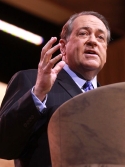 Yesterday, I received a forward of Mike Huckabee's latest newsletter. You can read the whole thing on
Yesterday, I received a forward of Mike Huckabee's latest newsletter. You can read the whole thing on 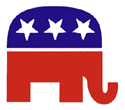 Recently, I was forwarded an email from the Republican National Committee, with the subject line, 'Week 15: A Rebirth Of Hope, Safety, And Opportunity'. You can read the full text on
Recently, I was forwarded an email from the Republican National Committee, with the subject line, 'Week 15: A Rebirth Of Hope, Safety, And Opportunity'. You can read the full text on 